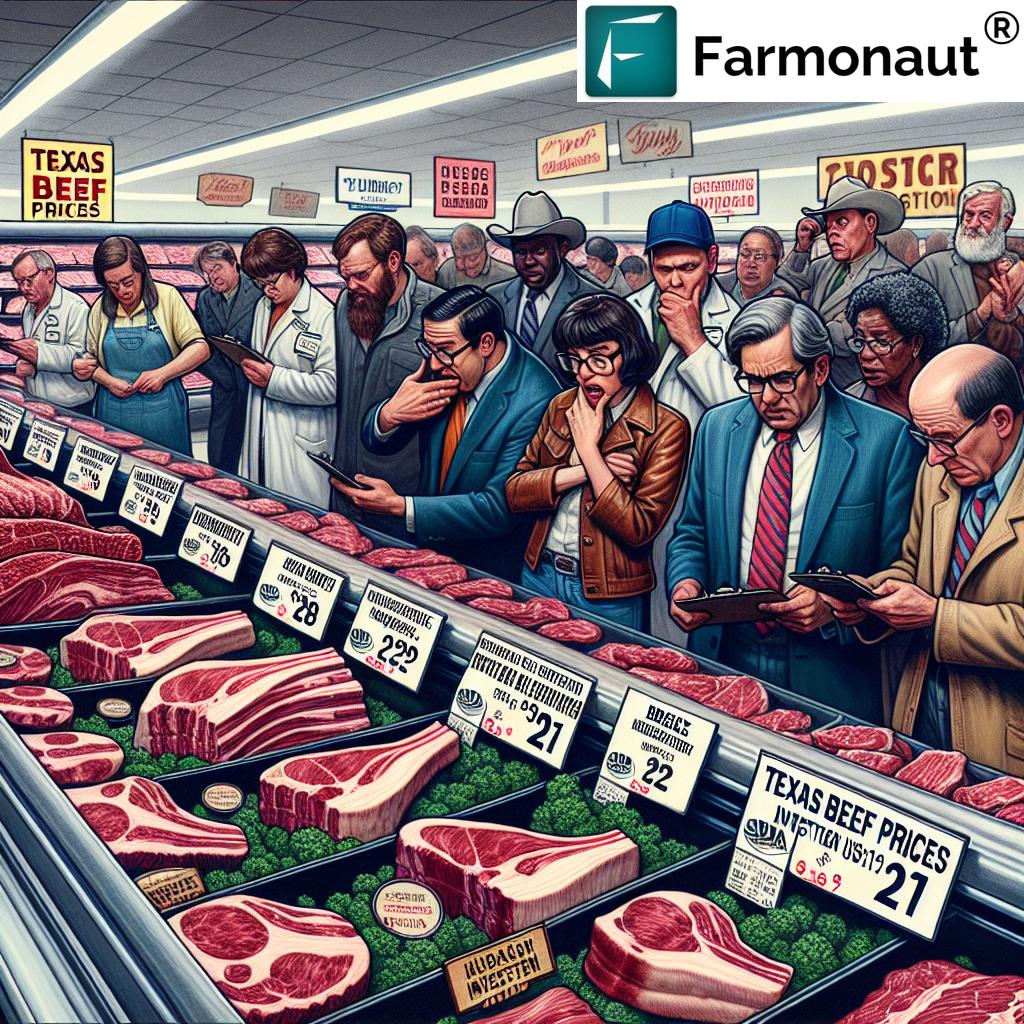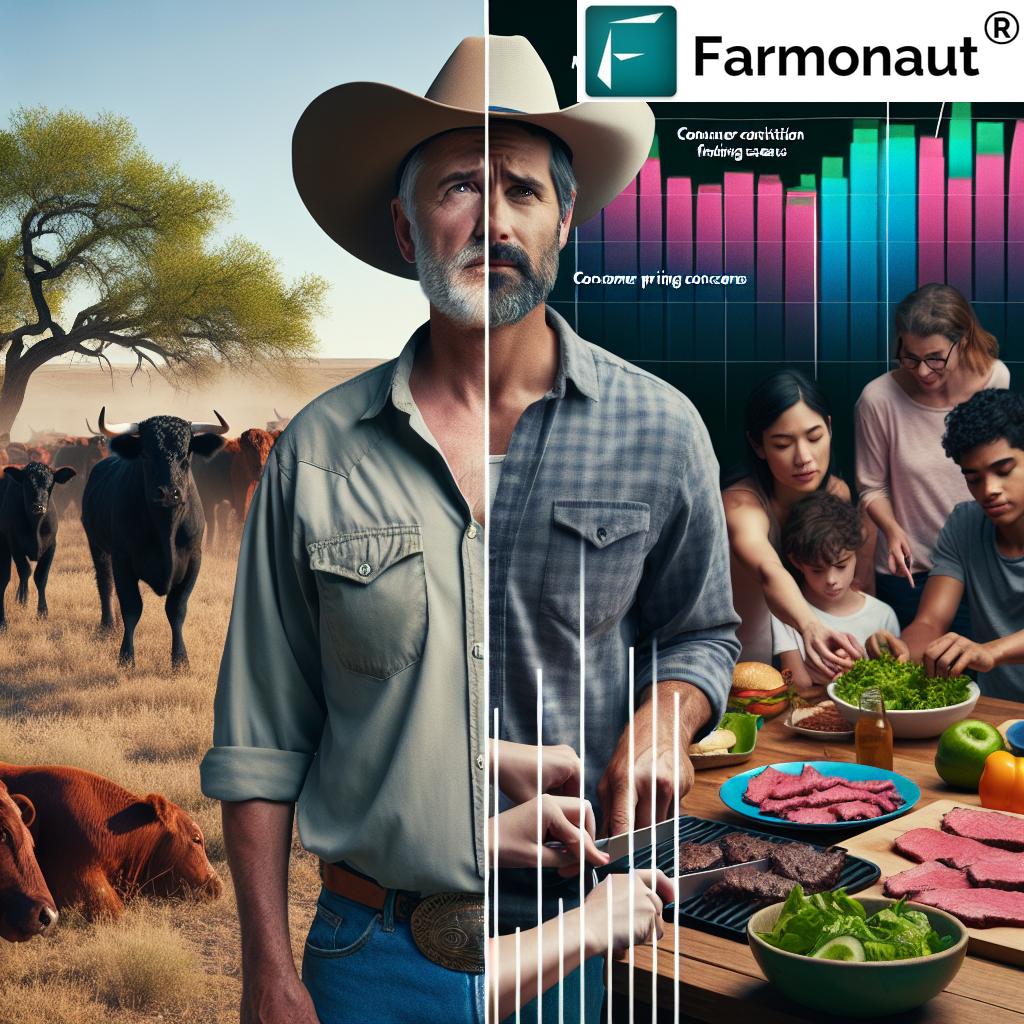Shocking Truth: USDA Probes Texas Beef Price Surge – Is Your BBQ Being Held Hostage?

HOUSTON, Texas (KPEL News) – As Texas beef prices continue to skyrocket, leaving many shoppers scratching their heads and tightening their belts, a new development has emerged that could shed light on this meaty mystery. The U.S. Department of Agriculture (USDA) has launched a full-scale investigation into the beef industry, aiming to uncover whether price-gouging tactics are behind the eye-watering costs at the checkout counter.
The Beef with Beef Prices: A Texas-Sized Problem
From the sizzling grills of backyard BBQs to the bustling kitchens preparing holiday feasts, the impact of soaring beef prices is being felt across the Lone Star State. Texas, known for its rich BBQ culture and substantial cattle industry, finds itself at the epicenter of this pricing predicament.
- Football tailgates are feeling the pinch
- Weekend BBQs are becoming budget-busters
- Holiday meal planning is turning into a financial puzzle
The USDA probe into grocery chains and meatpacking companies is not just another government initiative; it’s a beacon of hope for millions of Texans who are wondering if they’re being served a raw deal when it comes to beef pricing.
Unpacking the Investigation: What’s at Stake?
The USDA’s investigation is digging deep into the complex web of the beef supply chain, with a particular focus on two key areas:
- Meatpacking industry price gouging: A handful of powerful companies control a significant portion of the meatpacking sector. The investigation aims to determine if this consolidation is being used to artificially restrict supply and inflate prices.
- Grocery chain practices: Large national chains are under scrutiny for potentially leveraging their market dominance to keep prices high, squeezing out competition and leaving consumers with fewer affordable options.
For Texas, where beef is not just food but a way of life, the implications of this investigation are profound. The state’s massive cattle industry contributes significantly to the national beef supply, yet local consumers are facing prices that seem disconnected from this abundance.

The Ripple Effect: From Ranch to Table
The rising beef costs Texas BBQ joints and restaurants are experiencing is more than just a business challenge—it’s a cultural shift. Local eateries are faced with a tough choice: raise prices and risk losing customers, or absorb the costs and endanger their bottom line.
Meanwhile, the Texas rancher impact of beef prices is equally significant. Despite the state’s prominence in cattle production, many ranchers are not seeing the benefits of these high consumer prices, raising questions about where exactly the money is going in the supply chain.
Explore how technology is revolutionizing agriculture with the Farmonaut app. Click here to learn more:
Consumer Impact: Stretching Dollars and Changing Habits
As the USDA investigation unfolds, Texans are not sitting idle. Consumers are adapting to the high grocery costs in creative ways:
- Seeking out local farmers and independent meat markets for better deals
- Buying in bulk during sales to prepare for holiday meals
- Exploring alternative protein sources to supplement their beef consumption
The holiday meal budget Texas families are grappling with this year is forcing many to rethink traditional menus. As Thanksgiving approaches, the pressure is on to find ways to keep beloved beef dishes on the table without breaking the bank.
The Bigger Picture: Industry Consolidation and Its Consequences
At the heart of the USDA’s investigation is the issue of meatpacking consolidation. Over the years, the number of companies controlling the majority of beef processing has shrunk dramatically. This concentration of power has raised concerns about:
- Reduced competition leading to higher prices
- Increased vulnerability in the supply chain
- Potential for market manipulation
The cattle industry pricing concerns extend beyond just the cost to consumers. There are fears that the current system may be squeezing out smaller producers and limiting innovation in the sector.
For farmers looking to optimize their operations, Farmonaut’s API offers powerful insights. Learn more:
The Road Ahead: Potential Outcomes and Changes
As the USDA delves deeper into the Texas beef price investigation, several potential outcomes could reshape the industry:
- Stricter regulations on pricing practices in the meatpacking industry
- Increased support for smaller, local processors to boost competition
- Enhanced transparency requirements in the beef supply chain
- Possible break-up of larger meatpacking entities to reduce market concentration
For Texas consumers, these changes could mean more stable and potentially lower beef prices in the long run. It could also lead to a more diverse and resilient local beef industry, better equipped to handle future market shocks.
What Can Consumers Do Now?
While the investigation is ongoing, there are steps Texans can take to manage the impact of high beef prices:
- Stay informed about the USDA’s findings and industry developments
- Support local ranchers and butchers when possible
- Explore different cuts of beef that may offer better value
- Consider adjusting meal plans to include a wider variety of proteins
For agricultural professionals seeking cutting-edge tools, check out Farmonaut’s mobile apps:
Conclusion: A Turning Point for Texas Beef
The USDA’s investigation into beef pricing practices marks a critical moment for Texas’s beef industry and consumers alike. As the probe unfolds, it has the potential to address long-standing concerns about fairness and transparency in the market.
For now, Texans continue to navigate the challenges of high beef prices, balancing their love for BBQ and traditional beef dishes with the realities of their budgets. The outcome of this investigation could very well determine whether future generations of Texans can enjoy their beloved beef without feeling like their wallets are being held hostage.
As we await the results, one thing is clear: the relationship between Texans and their beef is being tested like never before. But if history is any indication, the resilience and adaptability of the Lone Star State will ensure that beef remains a cherished part of Texas culture, regardless of the challenges ahead.
Stay updated on agricultural innovations and market trends with Farmonaut’s comprehensive resources:
As this investigation continues to unfold, we’ll keep you updated on any developments that could impact your next BBQ or holiday feast. Stay tuned, Texas – the future of your beef may depend on it.


